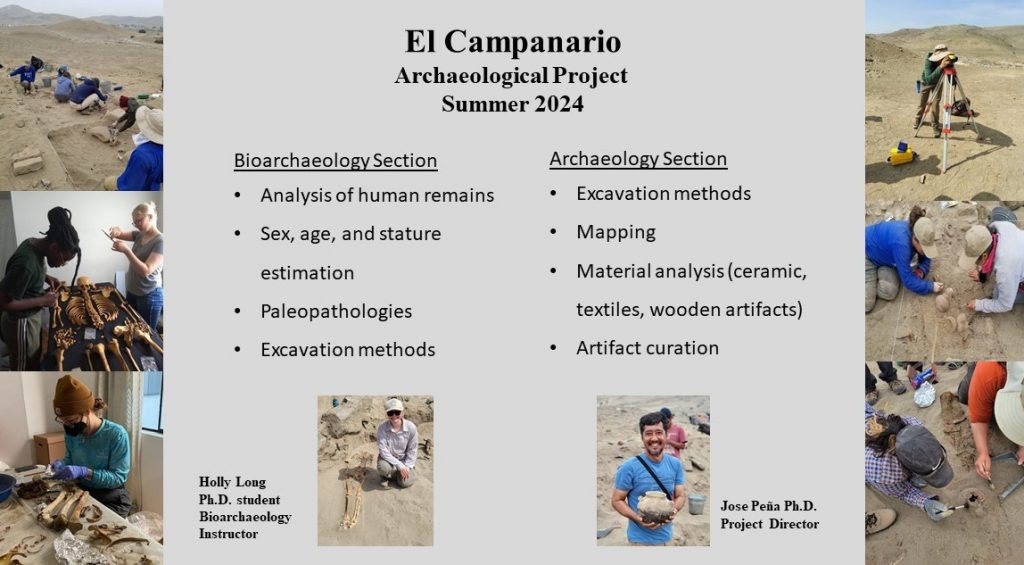Fieldwork






Location: Huarmey, PE
Season: June 3, 2024 to August 16, 2024
Session Dates: July 15 to August 16th
Application Deadline: May 25, 2024
Deadline Type: Rolling
Website: https://ecaphuarmey.wixsite.com/elcampanario
Program Type:
Field School, Volunteer
RPA Certified:
No
Project Director:
Jose L. Peña Ph.D.
Project Description:
El Campanario Archaeological Project started in 2015 to understand the socio-political organization of El Campanario site during the Late Intermediate Period A.D. 1000 and 1400. The initial excavations conducted at the El Campanario site focused on domestic structures to understand the social organization of households and the production activities conducted in these residential areas. The archaeological research at the household level revealed that the inhabitants conducted various production activities that included the manufacture of pottery, textile production, maize beer production, as well as the extraction of marine resources. In 2018, the project started the excavation of adobe (mud-brick) platforms and the cemetery which provided information about public architecture and mortuary practices. Various construction events were recorded during the excavation of the platform which indicated a period of remodeling and extension of public architecture by the local elite. In addition, excavations at the cemetery provided information about ancient people, such as mortuary practices, access to resources, and health conditions.
The objectives of the El Campanario Archaeological Project in 2024 will consist of the analysis of human remains and artifacts from the cemetery, the excavation of the adobe platform. Participants will learn excavation methods, mapping, profile drawing, recognizing cultural layers of occupation, identifying human remains, and recovering and identifying various archaeological materials such as pottery, stone tools, textiles, animal bones, seeds, and sea shells. During the laboratory work portion, participants will learn artifact classification, botanical analysis, pottery analysis, textile analysis, and lithic analysis.
El Campanario Archaeological Project will offer two separate fieldwork sections:
Bioarchaeology Section (5 Weeks): This section will consist of the excavation of the cemetery and laboratory work. This section will focus on osteology analysis, population demography, funerary rituals, and paleopathology.
Archaeology Section (5 Weeks): This section will consist of fieldwork and material analysis. In this section, participants will spend half of the fieldwork in the excavation of the adobe platform and the other half on the cemetery. This section will also include the analysis of human remains during the laboratory portion.
Period(s) of Occupation: Late Intermediate Period (1000 - 1400 A.D.)
Notes:
The El Campanario Archeological Project started in June of 2015 in order to obtain information about household activities and social interaction among the El Campanario inhabitants. The excavation conducted at El Campanario provided significant information about the socio-political organization in the Huarmey Valley during the Late Intermediate Period. The excavation work at the site will continue in the summer of 2024 with a focus on excavating a cemetery and the adobe platform.
Project Size: 1-24 participants
Minimum Length of Stay for Volunteers: 5 weeks
Minimum Age: 19
Experience Required: No experience is required to participate in this project.
Room and Board Arrangements:
What the cost include: pickup at Lima airport, accommodation in Lima and Huarmey, transportation from Lima to Huarmey and from Huarmey to the site, 3 meals a day for 6 days a week (5 weeks) in Huarmey, field trip to Caral (Supe Valley), Las Aldas and Sechin. What the cost does not include: Airfare, meals while in Lima, weekend meals in Huarmey, academic credits and travel insurance, and other personal expenses. Living accommodations will be in the city of Huarmey, which is about a 15 minute drive to the El Campanario archaeological site. Be advised that living accommodations will be basic in that the locale will have running water and electricity; internet connectivity may not be guaranteed but there are ample internet cafes located throughout the city of Huarmey.
Program Cost: 2.700 US dollars
Academic Credit:
El Campanario Archaeological Project (ECAP) does not offer academic credits to participants. However, the project team leader is willing to work with students to aid them in obtaining credits through their own academic institutions.
Jose L. Pena Ph.D.
721 S. Adanirom Judson Ave
Corona de Tucson
Arizona
85641
United States
Phone: 520 762 8865
The AIA is North America's largest and oldest nonprofit organization dedicated to archaeology. The Institute advances awareness, education, fieldwork, preservation, publication, and research of archaeological sites and cultural heritage throughout the world. Your contribution makes a difference.